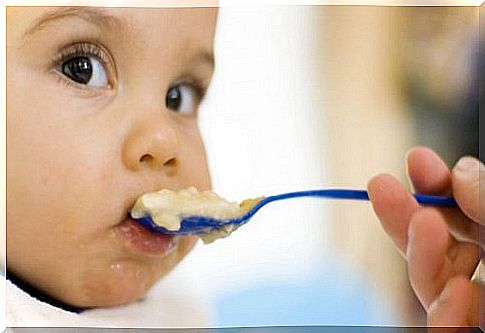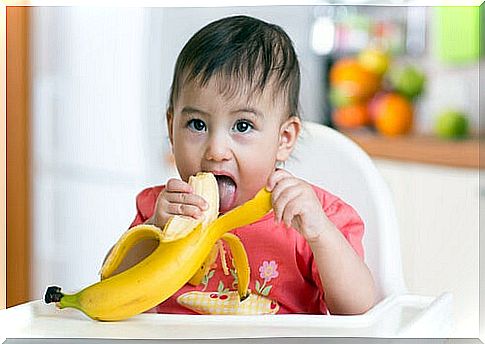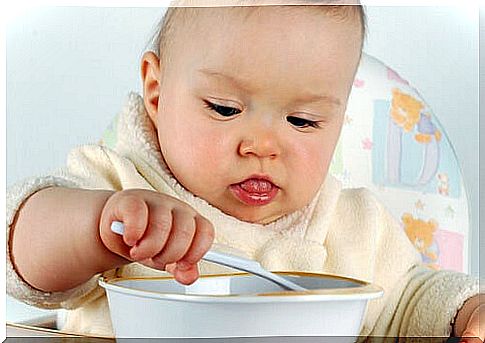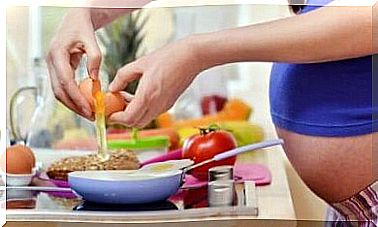The First Foods You Need To Give To Your Baby

Starting to give our children other types of foods besides milk is a complex matter. To a large extent, it depends on the degree of development of the baby. Here are some tips for the first foods of our babies.
According to the American Association of Pediatrics, babies should start eating solid foods between 4 and 6 months of age. In addition to age, another requirement for them to be able to give them the first foods besides milk is the fact that they show some specific signs of development.
When they appear, you will know that the baby will be ready to adopt a solid and varied diet.
The main signs we should notice are the following:
- The baby has lost the extrusion reflex (which prompts him to eject the spoon or food from his mouth).
- He expresses interest or curiosity when he sees other people eating and tries to reach for the foods.
- Even though he still needs a backrest, he can sit down while maintaining good head control.
- The baby’s weight has doubled since birth.
In carrying out this process, great care must be taken to proceed in harmony with the physiological development of the baby. The way to prepare the first foods is also fundamental, so that the formation of the diet is successful.
Below, we list some of the first foods to include in a healthy baby’s diet.
The 4 first solid foods for babies
1. Avocado
It is a great baby food because it contains healthy fats for growth and development. The soft and creamy texture of avocado is ideal for being tolerated by the baby’s digestive system.
This food is rich in vitamins A, C, niacin, folic acid, potassium, phosphorus, iron, magnesium and calcium. To prepare it you have to remove the zest, extract a creamy portion and soften it with a fork.
2. Bananas
This fruit is also ideal for introducing the baby to a solid diet. The properties of a banana make it ideal for the baby’s digestion. Its sweet taste and its texture mean that the little ones can accept and savor it. This fruit contains vitamin A, C, folic acid, potassium, phosphorus, selenium, magnesium and calcium.
Before giving the banana to the baby, peel it, purée it and, if you want it to be even softer, heat it up a little. You can add some of the breast milk or formula you use to make it easier to consume.

3. Meat
When the baby begins to change his diet, he may suffer from a lack of certain nutrients. Among these, the most important are iron, zinc and vitamin B12, present in foods of animal origin.
It should also be specified that the iron present in plants is not absorbed very easily by an organism that is not fully developed .
Due to what has been said above, it is recommended to include a portion of meat in the baby’s diet. A good way to give your child meat is to check that it is of good quality, cook it and grind it.
To change its consistency without any problem, you can soak it in a little water or broth without salt.
4. Mango
Mango is a food rich in vitamins A, C, E, K, folic acid, potassium, phosphorus, magnesium, calcium and sodium. As you can see, it is a sweet fruit that provides a large amount of nutrients to your baby’s body. Just like with other foods, you will need to peel it, remove the seeds and make a puree.

Recommendations for your baby’s diet
- Breast or formula milk should continue to be part of the baby’s diet, even after solid foods have been introduced. From these elements come the main calories and nutrients that the baby needs during the first year of life.
- When it’s time for a meal, make sure your baby is calm, clean and happy. In this way, he will be able to appreciate his foods more and begin to associate them with positive sensations.
- Choose only one food at a time. Give it to him for several days before moving on to a different one. This way, you can easily identify any kind of reaction that may possibly arise.
- If you notice that you are suffering from diarrhea, skin rashes or vomiting after ingesting a food, stop giving it and consult a doctor.
- If you intend to give your baby a cereal, make sure it is suitable for his age. The grains that the little ones have to consume are reinforced with specific nutrients.
Even if it is not a solid food, the meat broth without seasoning is also good for your child. Due to its texture and properties, it helps to strengthen the baby’s digestive system.
Another recommendation is to always check that these first foods are of good quality. In this way you will have the certainty of establishing good eating habits from the first months of life.









